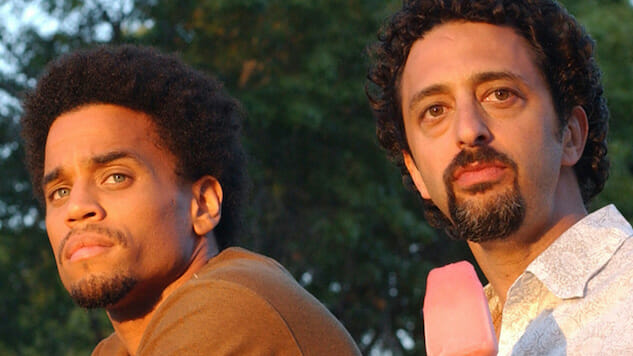The Forgotten Counterterrorism Drama That Put 24 to Shame
Showtime
To re-enter the world of 24 with 24: Legacy, which debuted Sunday night on Fox, is to step into a time capsule of sorts. Though Kiefer Sutherland is no longer the star—Corey Hawkins, recently of The Walking Dead and Straight Outta Compton, takes over leading-man duties—nothing much in the universe has changed: The heroes are American, the villains are Middle Eastern, and there’s always either a mole or a suspicion of one in the terrorism-fighting division known as CTU. In the context of President Donald Trump’s recent executive order clamping down on the ability of Muslims from seven Muslim-majority countries to enter the United States, the racial dynamics of 24: Legacy can’t help but feel retrograde, maybe even distasteful.
Though 24 did manage to dramatize some gray areas within its good-versus-evil binaries: Season Four’s Dina Araz (Shohreh Agdashloo), for instance, whose love for her son led her to betray her husband’s terrorist cause. And, of course, there was always Sutherland’s Jack Bauer, giving up pieces of his soul season by season even as he kept saving the world from destruction—Robert Cochran and Joel Surnow’s series generally treated sociopolitical matters with broad comic-book strokes, because too much nuance arguably would have detracted from the balls-out thrills of its action sequences, cliffhangers and headlong forward momentum.
In December 2005, though, a series premiered on Showtime that can be seen, especially now, as a response to the simplistic geopolitics proffered by 24: Sleeper Cell. The series ran for a mere two seasons (18 episodes in total) before cancellation, but with 24 continuing to live on through the likes of Legacy and its predecessor, the Sutherland-led 24: Live Another Day, Ethan Reiff and Cyrus Voris’s series deserves to be rediscovered. It’s a more thoughtful alternative to the America-first perspectives of its longer-lasting post-9/11 contemporaries.
At heart, Sleeper Cell is another narrative of American law enforcement taking down Muslim terrorists. But instead of making its hero a white American like Jack Bauer, the series centers around a Black American Muslim named Darwyn al-Sayeed (Michael Ealy). In the pilot episode, we first see Darwyn being released from prison and courted by the series’ main antagonist, a charismatic Arab extremist named Faris al-Farik (Oded Fehr), to join his team of “holy warriors” as they plan a deadly terrorist attack in Los Angeles. Only about halfway through the episode do we discover that Darwyn is, in fact, an FBI agent on a deep-cover assignment to infiltrate Farik’s group and prevent that attack. Through its first season, Reiff, Voris and company thus offer the kind of detailed, eye-opening look at the inner workings of a terrorist cell that 24 only grazed, at best. And by featuring a Muslim who fundamentally disagreed with the terrorists’ interpretation of the Quran and their murderous methods, Sleeper Cell touched on a deeper conflict that 24 wouldn’t have dared raise: a struggle for the soul of Islam itself.
Certainly, you won’t see on 24 the kind of earnest conversations between characters about their religious faith: their varying interpretations of the Quran, the way their own personal experiences inform their beliefs, and even Darwyn’s occasional attempts to sway these fundamentalist Muslims to act in a more humane manner. Both seasons, for instance, feature a scene in which one or all of the members of the respective cells attend a public service at a mosque in which they find their radical beliefs challenged by a more peaceful interpretation, one presumably closer to Darwyn’s own tenets. Amid its suspense and action set pieces, the series frequently takes time out to stage a genuine dialogue between these two diametrically opposed takes on Islam.
-

-

-

-

-

-

-

-

-

-

-

-

-

-

-

-

-

-

-

-

-

-

-

-

-

-

-

-

-

-

-

-

-

-

-

-

-

-

-

-








































